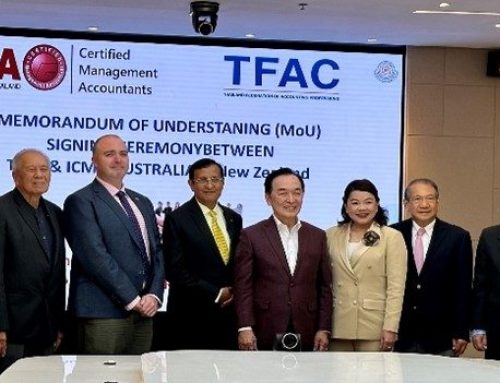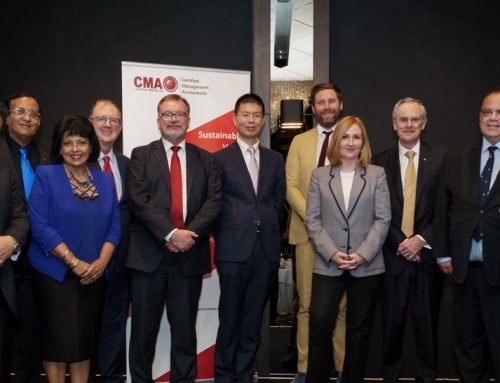Professor Ratnatunga believes it is time to consider the management accounting implications, “when the faults of some of these products are so great that corporations are actually launching glorified killing machines.”
The Boeing 737 Max
“In the aftermath of the second recent crash of the company’s almost brand-new aircraft, the 737 Max jetliner, there is evidence that Boeing was well aware of design faults but went ahead with the production and marketing of these veritable killing machines,” he says.
The latest accident led to a worldwide grounding of Boeing’s 737 Max aircraft and attention is focused on a flight-control system that Boeing admits can automatically push a plane into a catastrophic nose dive if it malfunctions and pilots don’t react correctly.
It also appears that the plane’s design certification and approval processes were significantly flawed and that U.S. regulators outsourced much of the plane’s safety assessment to Boeing itself, which delivered analyses with crucial flaws.
“We are now learning that U.S. Federal Aviation Administration (FAA) employees who approve new and modified aircraft designs warned as early as seven years ago that Boeing had too much sway over safety approvals of new aircraft but they faced retaliation for speaking up,” he says.
The 737 Max was produced in response to the release of the single-aisle, fuel-efficient Airbus A320 Neo. Boeing estimated the market would be worth some $2.5 trillion over the next 20 years and decided it needed a single-aisle plane with 20 percent better fuel efficiency and lower operating costs that could quickly be brought to market.
Professor Ratnatunga asserts that, “There were challenges in design requirements and cost management. Boeing decided to use an earlier version of the 737, rather than design the aircraft from scratch. In the revised design, the engines were moved forward but this meant the more powerful engines could pitch the jet’s nose upward, creating the conditions for a mid-air stall.”
To prevent the stall, Boeing created an automated-flight-control feature called the Maneuvering Characteristics Augmentation System (MCAS). When MCAS sensors detected the nose of the plane pitching up, the software controlling the tail’s horizontal stabiliser would automatically push the nose back down. “It was a cost-minimising way to fix the design problem and it understated the extent to which MCAS might take automated control of the plane,” says Professor Ratnatunga.
In another move that Professor Ratnatunga asserts was designed to keep costs to a minimum, Boeing decided, with the support of regulators, not to provide extensive pilot training, including how to disable the software. Boeing stated that flight-simulator training for pilots, which costs airlines time and money and could have dampened sales, weren’t necessary. Boeing has now acknowledged that training guidelines for the 737 Max did not mention MCAS.
These strategies got the 737 Max to market faster, just nine months after Airbus introduced the A320 Neo. “Due to the cost savings it offered airlines in terms of fuel efficiency and pilot training, the Max was an immediate hit, garnering more than 5,000 orders from over 100 customers worldwide. It received FAA certification in March 2017 and regulators around the world followed suit. Two months later, Boeing began deliveries of its 737 Max, seemingly well aware that they were potential killing machines,” says Professor Ratnatunga.
The Volkswagen Diesel Emissions Scandal
“Volkswagen (VW) is another classic example of a company that got away with practices that not only broke the law but resulted in the production and distribution of killing machines,” says Professor Ratnatunga.
VW installed software that activated pollution controls during testing and switched them off in real-world driving. The software allowed the cars to spew harmful nitrogen oxide at up to 40 times the legal limit. Some estimates contend that the health of up to 200,000 people has been negatively impacted by these actions, with many deaths attributed to the deadly air pollution.
VW initially denied the use of the so-called ‘defeat device’ but finally admitted it in September 2015 and reached a $US15 billion civil settlement with environmental authorities and car owners in the US under which it agreed to repair or buy back up to 500,000 of the affected vehicles.
“While one would assume that such negative publicity, massive criminal charges, huge civil settlements and potential investor lawsuits and criminal probes would affect VW’s long-term share price, it was not the case. After a massive 20 per cent fall when the diesel-emissions scandal broke in October 2015, just two years later Volkswagen AG’s share price was back above 2015 levels,” says Professor Ratnatunga.
How Do Management Accountants Fit Into The Picture?
Cost savings!
As organisations become leaner, design engineers and management accountants look for ways to reduce costs, however Professor Ratnatunga believes they must be conscious of the quality-cost trade-off and apply a higher moral and ethical standard to situations where there is a conflict between maximising a company’s shareholder value and the social responsibility of keeping customers safe.
“The pursuit of higher profits and shareholder value may lead companies to undertake unsafe and/or unethical actions, as the costs of these actions are often easily absorbed by the sheer volume of revenue they generate. In other words, companies assess the profitability of law breaking or causing the loss of life by weighing the benefit to be gained against the cost of being caught multiplied by the probability of being caught,” he says.
Professor Ratnatunga says that, “These examples demonstrate the importance of clearly communicating the management accounting numbers on which critical decisions are made, especially where a company’s products and services may endanger human lives. It also shows that human life cannot be equated to a monetary value in settling a legal liability.”
Prof Janek Ratnatunga
CEO, ICMA Australia
The opinions in this article reflect those of the author and not necessarily that of the organisation or its executive.
[ends]
For further comment on the above topic, please contact:
Prof Janek Ratnatunga
CEO, ICMA Australia
Mobile: +61432758380
Email: [email protected]
About the Author
Professor Janek Ratnatunga is the CEO of the Institute of Certified Management Accountants. He has held senior appointments at the University of South Australia, Monash University, University of Melbourne, and the Australian National University in Australia; and the Universities of Washington, Richmond and Rhode Island in the USA. Prior to his academic career he worked as a chartered accountant with KPMG. He has also been a consultant to many large Australian and international companies and to the World Bank.



Stay In Touch